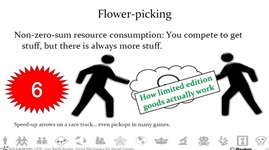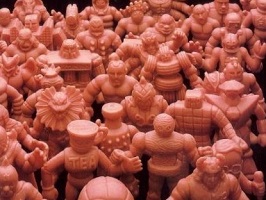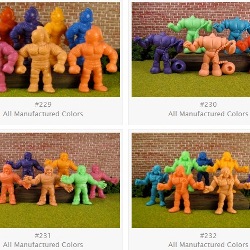I have recently been deeply entrenched in a riveting conversation with an intelligent and respected colleague regarding the reason why people collect things. Aside from reading various journal reports, I have even reached out to several psychologists for their opinion. There have been a variety of responses, but one specifically resonated with me. She said that, “People collect because it’s fun. Humans are intrinsically pleasure seekers and collecting is a pleasurable experience for them.”
I don’t know that her response perfectly encapsulates the truest “why” of the original question, but it has encouraged me to continue exploring collecting as a human behavior. That’s why my interest was piqued when I stumbled across a BoingBoing.com article titled, “Taxonomy of social mechanics in multiplayer games.”
The article linked to another article and a PDF of Raph Koster’s presentation, “Social Mechanics: The Engines Behind Everything Multiplayer,” from the Game Developer Conference in San Francisco. The information from the presentation is unquestionable valuable and insightful for game developers, however, as I looked through the actual presentation slides it appeared that collecting could be viewed as a game – specifically a social game.People find a wide variety of activities fun. This singular similarity does not suggest that all of these fun activities would fit within the same paradigm. Activities such as reading, sky diving, and church choir singing would likely be poor candidates to be grouped into the “game” paradigm.
Using Raph Koster’s presentation, there are several points that strongly suggest collecting is very much a game for many collectors. Some of the most notable similarities are listed below:
Defining a “Single Player Game” – A game that is not played in opposition to, or in parallel with, or collaboratively with, someone else.
As Mr. Koster pointed out, hardly anything fits that description. Any M.U.S.C.L.E. collector that is actively collecting is, at least, collecting parallel to others. Thankfully the vast majority of collecting is done collaboratively and, unfortunately, occasionally in opposition to other collectors.
Boundaries
The rules of games, although sometimes broad, ultimately define where gameplay stops. Many collectors, including M.U.S.C.L.E. collectors, having varying perspectives in regards to the rules of collecting. This variance is likely the single greatest cause of discord among collectors.
Helping – The simplest form of multiplayer.
From the MPS newsletter, to AKIA, to LRG, and everything beyond – M.U.S.C.L.E. collectors have been an immensely helpful, advice offering group.
Flower-Picking & Dot Eating
These ideas are likely to have adamant supporters and detractors. M.U.S.C.L.E. collectors may be the collectors most likely to believe something is limited (Dot Eating), when in reality there will always be more (Flower-Picking). M.U.S.C.L.E. collecting is certainly a “Flower-Picking” activity.
Truthfully, parallels could be made to almost all of Raph Koster’s 189 slides. M.U.S.C.L.E. collecting has: Robert Merton’s theory of deviance to player lifecycles (although I could appreciate a descending view), common rituals (i.e., Satan Cross, Flesh Set, etc.), Reciprocity, Identity, Ostracism, Clusters, Networks, Preferential attachment, Structuration, Community, Arts, and more.There are certainly both advantages and disadvantages if M.U.S.C.L.E. collecting is viewed as a game. However, the greatest benefit to viewing M.U.S.C.L.E. collecting as a game is that games are fun. I don’t know of many people that play games because the dislike them. If M.U.S.C.L.E. collectors consider their collecting as a social game, then hopefully all M.U.S.C.L.E. collectors will have even more fun collecting.
SPECIAL NOTE: All images and bolded text humbly taken, without permission, from Raph Koster’s presentation, “Social Mechanics: The Engines Behind Everything Multiplayer.”





#1 by vette88 on March 3, 2011 - 10:50 am
Having a “multiplayer” atmosphere does make collecting more fun. It gives people the opportunity to share their collection, swap knowledge, and help one another. The television show American Pickers is a good example of this. Many of the people they buy from are excited to have others view their items. They also like to test Mike’s and Frank’s knowledge. Like Pawn Stars, you’ll see Mike and Frank giving/receiving help in the form of appraising items.